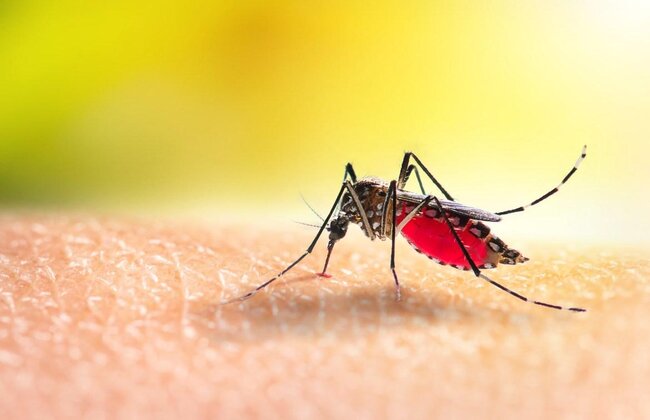
The number of dengue patients and fatalities continues to spike across the country this year too with hospitals struggling to provide treatment to the growing number of patients due to insufficient facilities.
Experts fear that the dengue situation may worsen in October when the hospitals and clinics are already overwhelmed with dengue patients.
Till September 22, the death toll from the mosquito-borne disease stood at 131 with 24,034 cases.
Two months back, experts warned about the possibility of severe dengue outbreak in September, yet there have been no visible efforts from the authorities concerned. Concern is growing among people as October is likely to see even worse dengue situation.
Visiting Dhaka Medical College and Mugda Medical College and Hospital, it was found that these hospitals have been struggling to accommodate the dengue patients and setting up additional beds on the corridors to provide treatment.
Talking to UNB some physicians at the hospitals said the current month is seeing continuous increase in dengue cases compared to previous months.
Over 2,800 patients were admitted to the two hospitals in August while some 2,500 patients have already been hospitalised this month-with eight days still remaining.
Many patients have been admitted in critical condition, showing symptoms such as low blood pressure, multiple organ dysfunctions, vomiting and lethargy, they said.
Recent rainfall and waterlogging might be the reason behind the surge in dengue patients. Physicians say that many patients are being hospitalized with severe symptom of Dengue, particularly shock syndrome.
What DGHS, experts say
According to the Directorate General of Health Services (DGHS), the number of dengue cases is increasing compared to previous months, with 55% of patients hospitalized outside Dhaka.
Moreover, negligence is also blamed for rising deaths. Without providing necessary treatment at upazila health complexes, patients are referred to other hospitals unnecessarily, exacerbating the crisis.
Dr. Mushtaq Ahmed, an adviser to the Institute of Epidemiology, Disease Control and Research (IEDCR), said as the number of dengue patients rises, the death toll will proportionally increase, noting that the causes for which 2023 witnessed the highest deaths have not been resolved.
He emphasized the need for decentralization of medical care, as patients with less risks are often kept at the city hospitals unnecessarily instead of providing care at upazila or local hospitals, putting strains on the proper treatment of critical patients.
Prof Kabirul Bashar, a Zoology Department teacher of Jahangirnagar University, addressed that the primary healthcare facilities at the upazila level should be properly equipped to treat dengue patients instead of transferring them to district or divisional hospitals, which may delay necessary treatment.
To effectively control dengue, he urged for evidence-based integrated mosquito management strategies and a shift from a job-oriented to a service-oriented mindset among responsible agencies.
“Under hotspot management, crash programs should be done within 200 meters of houses where there are dengue patients. Flying Aedes mosquitoes and larvae must be destroyed.”the expert suggested.
Anti-mosquito drives in capital
DSCC Administrator Dr. Mohd Sher Ali told UNB that following the directives from Local Government Adviser AF Hassan Arif, instructions have been given to all concerned to ensure ‘coordinated and proper implementation of mosquito control activities’ in Dhaka South and North City Corporations.
He, however, said they are implementing necessary activities with due importance to destroy the breeding places of Aedes mosquitoes.
DSCC Chief Executive Officer Md Mizanur Rahman said, “Our health department and waste management department have started conducting special cleanliness and mosquito control activities in the areas where the prevalence of Aedes mosquitoes is high. Through this, we will be able to reduce the spread of dengue disease. ”
DNCC Administrator Md Mahmudul Hasan said the sources where Aedes larvae can grow should be cleaned and destroyed alongside spraying insecticides regularly to control dengue.
The monitoring team consisting of officials of different departments is properly supervising the activities conducted in each region. Students and other citizens need to be involved, he said.
“Our staffers clean the surroundings of the house and spray medicines. But it is not possible for our employees to work indoors. So you have to keep your houses clean. Refrigerators, ACs, flower tubs, unused tires, coconut shells, open packets of chips, various types of open containers, rooftops or any other places should be kept free from stagnant water,” he added.
On September 19, the DNCC launched a week-long special mosquito eradication programme across all wards, which will continue until September 25. Each ward has been divided into sub-blocks for targeted inspections to identify and destroy mosquito breeding grounds


